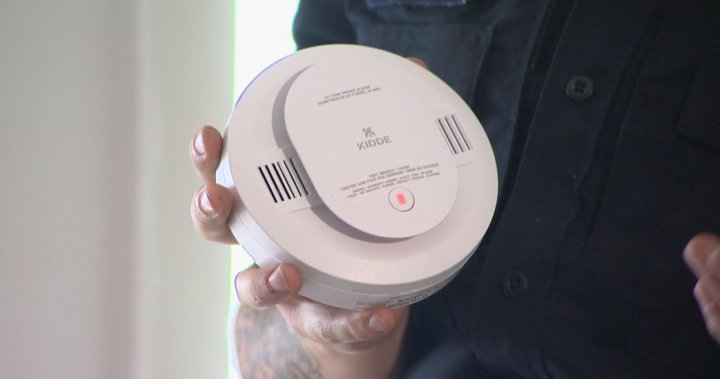Laura McComber’s mind is more at ease.
On Wednesday, the resident in the Mohawk community of Kahnawake, south of Montreal, had a smoke detector installed in her home, where her parents lived. It’s her first one.
“There was never any alarm systems,” she told Global News. “I don’t think they had anything like that back in the day.”
Fire officials estimate that only about half the homes in that community have smoke detectors, and that the smoke detector shortage also exists in Indigenous communities across Canada.
“Part of it comes down to education,” explained Arnold Lazare, Indigenous fire marshal for Canada. “People don’t knowingly not install smoke alarms. We found out that in many instances it comes down to economics where people have other priorities.”
Get breaking National news
For news impacting Canada and around the world, sign up for breaking news alerts delivered directly to you when they happen.
It’s why a coalition of private and and Indigenous groups have launched a pilot project to distribute and install more than 6,000 smoke alarms for Indigenous families across the country. They’re distributing the alarms to 16 Indigenous communities, including Kahnawake, which is getting just over 500.
“While [Indigenous Peoples] only make five per cent of the population in Canada, they make about 20 per cent of fire related deaths,” Ivanette Bonilla explained. She’s chief communications & government relations officer for Kidde, the company providing the devices.
“There’s a great need to raise awareness of fire safety education, but also access to working smoke alarms.”
Lazare agrees.
“There was a fire in Kahnawake recently that the family didn’t have a working detector,” he recalls. “Their injuries are probably graver than what would’ve happened if they had a working detector.”
Included in the pilot project is fire safety education, without which the distribution of equipment would not be as effective, officials say.
“That includes our tool kit,” said Bonilla. “It has information on how to create a family escape plan so that everyone in the home knows what to do, including children.”
The groups want to expand the project if this first phase goes well.
© 2025 Global News, a division of Corus Entertainment Inc.

